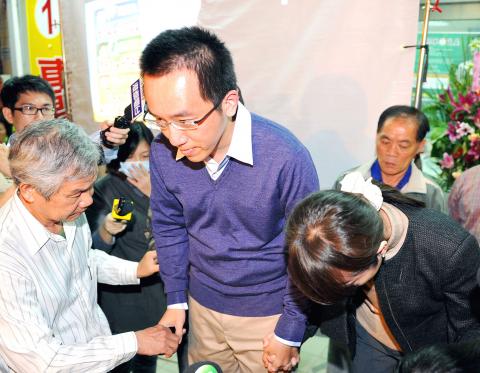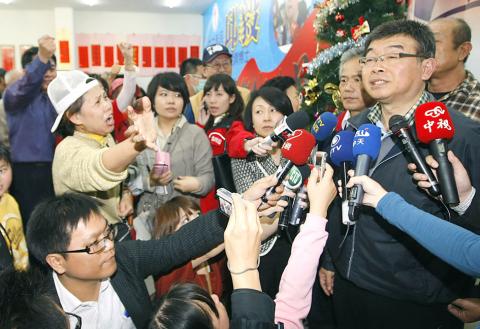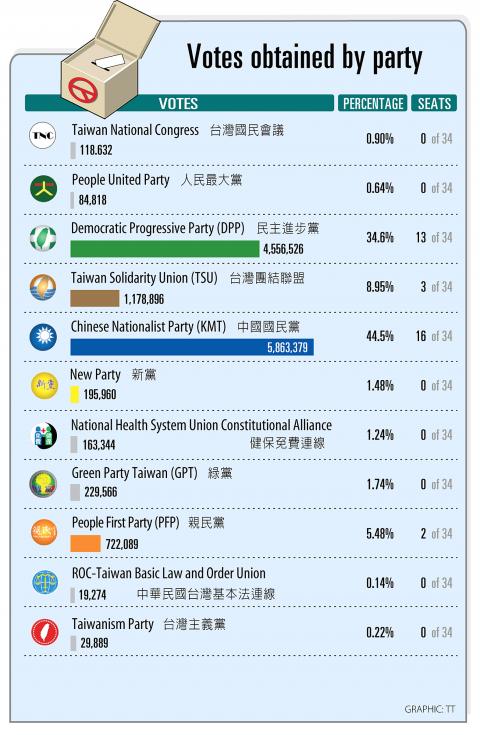The pan-green camp yesterday made substantial gains in the legislature, with the Democratic Progressive Party (DPP) and the Taiwan Solidarity Union (TSU) obtaining more than 43 percent of votes in the legislative election, against a little more than 50 percent for the Chinese Nationalist Party (KMT) and the People First Party (PFP).
The DPP secured more than 4.5 million votes, or 34.6 percent of the vote. The TSU won 1.18 million votes, or 8.95 percent of the vote, while the KMT obtained more than 5.86 million, or 44.55 percent, and the PFP 722,000, or 5.48 percent.
Both the TSU and the PFP made their way back into the legislature by garnering more than 5 percent of the popular vote, a requirement for parties to secure legislator-at-large seats.

Photo: Huang Chih-yuan, Taipei Times
The PFP had a total of 12 candidates competing in the fourth, sixth and eighth districts of Taipei, the first district in New Taipei City (新北市), the seventh and eighth districts in Greater Taichung, the first district in Greater Tainan, in Kinmen County and the third district of Taoyuan County, as well as the mountain area and plains Aboriginal districts.
Some of them were popular legislators, including Lee Ao (李敖) and Liu Wen-hsiung (劉文雄), but almost none were able to gain sufficient votes to come out on top.
The performance of the candidates fielded by the two major parties — the KMT and the DPP — varied.

Photo: CNA
Despite the high publicity that surrounded his campaign, Chen Chih-chung (陳致中), the son of former president Chen Shui-bian (陳水扁), failed in his first bid as an independent candidate. His participation in the ninth district of Greater Kaohsiung is believed to have split the DPP vote and may have cost the DPP’s Kuo Wen-cheng’s (郭玟成) bid for re-election as he lost to KMT Legislator Lin Kuo-cheng (林國正).
Former New Party legislator Joanna Lei (雷倩), the daughter of former Vice Admiral Lei Hsueh-ming (雷學明), who left the KMT in 2007 for the New Party, also failed in her bid as an independent candidate in Zhonghe (中和), New Taipei City.
Former Lienchiang County commissioner Chen Hsueh-sheng (陳雪生), formerly of the PFP, but who ran as an independent, defeated incumbent KMT legislator Tsao Erh-chang (曹爾忠), who was seeking a sixth term in the legislature.

GRAPHIC: TT
Lin Pin-kuen (林炳坤) of the Non-Partisan Solidarity Union and the incumbent legislator for Penghu was defeated by DPP Penghu County councilor Yang Yao (楊曜). Some attributed Lin’s surprising defeat to the fact that the airport in Penghu was closed because of heavy fog, which prevented some people from returning home to vote.
Despite his failure to unseat the KMT’s Alex Fei (費鴻泰), Green Party candidate Pan Han-sheng (潘翰聲) garnered more votes this year, as the DPP and PFP did not field candidates in the seventh district of Taipei.
Former legislator Lo Fu-chu (羅福助), who was running as an independent candidate in the 12th district of New Taipei City and is rumored to have ties to organized crime, trailed the incumbent, KMT Legislator Lee Ching-hua (李慶華) and DPP candidate Shen Fa-hui (沈發惠).
Lo’s son, KMT Legislator Lo Ming-tsai (羅明才), was re-elected in the 11th district of New Taipei City.
Meanwhile, four former Government Information Office ministers also ran in the legislative elections this year, with mixed results.
Su Jun-pin (蘇俊賓), who was running for the KMT in Greater Tainan, failed to unseat DPP Legislator Hsu Tain-tsair (許添財). Johnny Chiang (江啟臣) of the KMT beat his opponent, DPP legislative nominee Kuo Chun-ming (郭俊銘), in Greater Taichung.
DPP candidates Lin Chia-long (林佳龍) and Pasuya Yao (姚文智) both won in Greater Taichung and Taipei respectively. Lin defeated the incumbent, KMT legislator Daniel Hwang (黃義交), while Pasuya Yao defeated Justin Chou (周守訓) of the KMT.
Former government spokesperson Chuang Suo-hang (莊碩漢), meanwhile, failed in his bid to unseat KMT Legislator Lu Chia-chen (盧嘉辰).

Taiwan is stepping up plans to create self-sufficient supply chains for combat drones and increase foreign orders from the US to counter China’s numerical superiority, a defense official said on Saturday. Commenting on condition of anonymity, the official said the nation’s armed forces are in agreement with US Admiral Samuel Paparo’s assessment that Taiwan’s military must be prepared to turn the nation’s waters into a “hellscape” for the Chinese People’s Liberation Army (PLA). Paparo, the commander of the US Indo-Pacific Command, reiterated the concept during a Congressional hearing in Washington on Wednesday. He first coined the term in a security conference last

Prosecutors today declined to say who was questioned regarding alleged forgery on petitions to recall Democratic Progressive Party (DPP) legislators, after Chinese-language media earlier reported that members of the Chinese Nationalist Party (KMT) Youth League were brought in for questioning. The Ministry of Justice Investigation Bureau confirmed that two people had been questioned, but did not disclose any further information about the ongoing investigation. KMT Youth League members Lee Hsiao-liang (李孝亮) and Liu Szu-yin (劉思吟) — who are leading the effort to recall DPP caucus chief executive Rosalia Wu (吳思瑤) and Legislator Wu Pei-yi (吳沛憶) — both posted on Facebook saying: “I

Sung Chien-liang (宋建樑), who led efforts to recall Democratic Progressive Party (DPP) Legislator Lee Kun-cheng (李坤城), was released on bail of NT$80,000 today amid outcry over his decision to wear a Nazi armband to questioning the night before. Sung arrived at the New Taipei District Prosecutors’ Office for questioning in a recall petition forgery case last night wearing a red armband bearing a swastika, carrying a copy of Adolf Hitler’s Mein Kampf and giving a Nazi salute. Sung left the building at 1:15am without the armband and covering the book with his coat. Lee said today that this is a serious

A mountain blaze that broke out yesterday morning in Yangmingshan National Park was put out after five hours, following multi agency efforts involving dozens of fire trucks and helicopter water drops. The fire might have been sparked by an air quality sensor operated by the National Center for High-Performance Computing, one of the national-level laboratories under the National Applied Research Laboratories, Yangmingshan National Park Headquarters said. The Taipei City Fire Department said the fire, which broke out at about 11am yesterday near the mountainous Xiaoyoukeng (小油坑) Recreation Area was extinguished at 4:32pm. It had initially dispatched 72 personnel in four command vehicles, 16